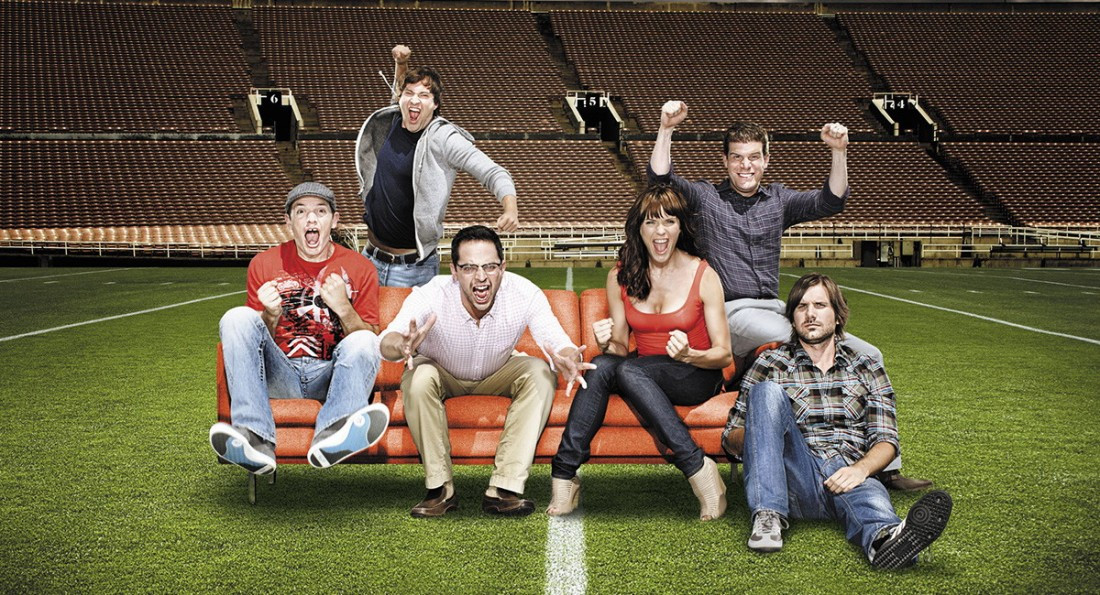AIDS isn’t a punchline
Cable series “The League” pushes the limit
Last week, the new season of The League, a semi-improvised knock off of It’s Always Sunny in Philadelphia on FXX (a comedy offshoot of the Fox offshoot FX) premiered. The show follows the exploits of a group of Illinois friends in a fantasy football league and stars comedians Nick Kroll, Jon Lajoie, Paul Scheer (think of these three as guys who maybe weren’t talented enough to be on Stella but are now more famous than the guys from Stella) and an actor named Stephen Rannazzisi who isn’t funny at all.
It also stars mumblecore power couple Mark Duplass and Katie Aselton, each of whom this writer crushes on for different reasons (making them the reason I watch The League, since I have no interest in fantasy football).
The point of this piece isn’t to talk about fantasy sports leagues or indie cred, though. What irked me about the season premiere was the appearance of Seth Cohen (whose real name is apparently Adam Brody, who is apparently an actor and has apparently played many other parts) as the California member of their league, whose fantasy team won what they call the “Shiva Bowl”. When they head out to California for their draft at Seth Cohen’s request, they all make cracks about how Cohen has lost weight, looks good, etc. Cohen (or Brody, or whatever his character’s name is on this show) informs them that he has lost over 70 pounds because he has AIDS. This is met with cavalier jokes from the crew.
“Don’t you mean HIV?”
“Nope, already had that.”
“So you’re full blownsies now, hey?”
Eventually, Rannazzissi’s character takes Brody’s triple cocktail of pills, proclaiming that he wants the “AIDSvantage” to win the fantasy championship.
My questions is - when did it become okay to make fun of AIDS on TV?
In 2002, South Park aired an episode that saw town moron Randy Marsh proclaim that “It’s been 22.3 years, so AIDS is finally funny” after a mix up involving Subway spokesperson Jared Fogle announcing he had lost weight with the help of his aides. On South Park’s season 12 premiere in 2008, AIDS was tackled again - this time, eluding that HIV could be kept at bay by having millions of dollars, citing Magic Johnson as an example.
Yes, both of these shows are “hidden from the mainstream” on cable networks. No, you’d never see a character on a network show, such as Modern Family’s Phil (wishing his real estate nemesis was sick) or Dwight on The Office (hatching a plan to infect Jim) joking about AIDS. It would be treated as “a very special episode” - not unlike episodes of The Hogan Family, Degrassi High, Designing Women or Mr. Belvidere in the 80s, on which a supporting character (usually a one-off guest shot) revealed it was HIV positive.
So when did this shift occur? It appears as though the network programs used these characters to show how anyone is at risk. In the 90s ER gave two main characters, Jeanie Boulet and her estranged husband Al, the virus. Jeanie survived, Al didn’t.
This was dealt with in a straightforward manner, humanizing HIV and AIDS at a time when there was a stigma, though there definitely still seems to be. It went from being handled awkwardly on 80s sitcoms to being seriously dealt with on 90s drams and then mocked during the 2000s. Commenters under a clip from a South Park episode on YouTube discuss how they can’t wait until 9/11 and Treyvon Martin can be “funny like AIDS”. What’s the joke, exactly? That someone is suffering? Is that all it takes for certain people to laugh?
All sorts of hot button topics, such as rape and the “N” word, have comedians (Patton Oswalt, Louis C.K.) taking the piss out of people who get it wrong. The unfortunate side effect of making light of AIDS, rape and racism is that people will always laugh at things they’re uncomfortable with. Yes, it gets people talking about it, but most of it is negative spin.
Last month, writer Caitlin Moran defended tweets she had made a while back, joking about AIDS. In a response piece Moran wrote on Twitmonger, she admitted to joking about the disease, not its victims, because it terrifies her.
“I don’t make jokes about sufferers - I make jokes about the disease, in the same way I make jokes about cancer and cystitis and vaginal tearing and mastitis and anxiety,” she writes.
This brings up a lot of questions about whether or not the internet has more influence right now than network television (or if it would make a difference if Moran was HIV positive - she isn’t) but that’s another column for another time.
Moran’s point is interesting - and if you examine each of these TV episodes (and countless others) it does seem as though more times it is the disease that is being uncomfortably mocked, not its sufferers. Does that make it okay when someone jokes about it, even if it is Seth Cohen? You might say “if you don’t like it, don’t watch it” but that doesn’t make any of it go away. Maybe we need those “very special episodes” to come back to network TV, with a 2013 twist. My vote is for Nick Kroll to host a reality show about people going for HIV tests and we’ll see if he feels like saying “full blownsies” then. If irony can make a comeback after its 2001 death, anything is possible.
Published in Volume 68, Number 2 of The Uniter (September 11, 2013)







